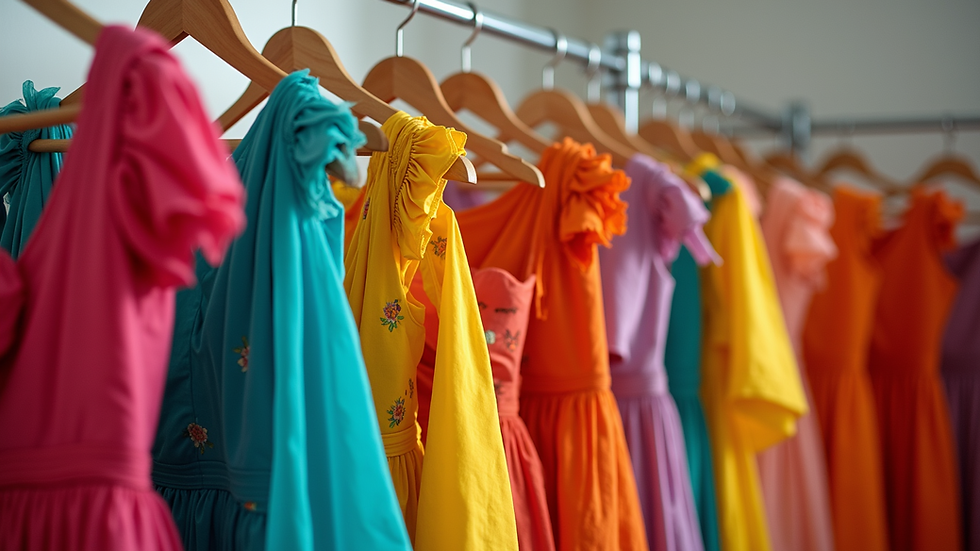Exploring the Future of Wardrobe Innovation
- Donta Bosha

- Jul 28
- 4 min read
The world of fashion is evolving rapidly, and wardrobe innovation is at the forefront of this transformation. As technology advances and consumer preferences shift, clothing designs are becoming more functional, sustainable, and personalized. This blog post explores the exciting future of clothing designs, highlighting key trends, practical insights, and ways to spark creativity in this dynamic industry.
The Evolution of Clothing Designs: From Tradition to Technology
Clothing designs have come a long way from simple hand-stitched garments to high-tech apparel embedded with smart features. Today, designers are blending traditional craftsmanship with cutting-edge technology to create garments that do more than just look good.
Smart Fabrics: Materials that can regulate temperature, monitor health, or change color based on the environment.
Sustainable Materials: Use of recycled fibers, organic cotton, and biodegradable fabrics to reduce environmental impact.
Customization: Advances in 3D printing and AI allow for personalized fits and styles tailored to individual preferences.
These innovations are not only enhancing the aesthetic appeal but also improving comfort, durability, and functionality. For example, some jackets now come with built-in heating elements controlled via smartphone apps, perfect for cold climates.

Key Trends Shaping Modern Clothing Designs
Understanding current trends is essential for anyone interested in the future of wardrobe innovation. Here are some of the most influential trends shaping clothing designs today:
1. Sustainability as a Priority
Consumers are increasingly aware of the environmental impact of fashion. Brands are responding by adopting eco-friendly practices such as:
Using organic and recycled materials
Implementing zero-waste production techniques
Offering clothing recycling programs
2. Integration of Technology
Wearable technology is becoming mainstream. Examples include:
Fitness trackers embedded in workout clothes
UV-protective fabrics for outdoor wear
Clothes with LED lights for safety and style
3. Versatility and Multi-functionality
Modern consumers want clothes that adapt to different occasions. Convertible designs, reversible jackets, and modular pieces are gaining popularity.
4. Inclusive and Adaptive Clothing
Designers are focusing on inclusivity by creating adaptive clothing for people with disabilities and offering a wider range of sizes and fits.
These trends reflect a shift towards more thoughtful, user-centered clothing designs that prioritize both style and practicality.

How do I get ideas for clothing design?
Generating fresh ideas for clothing design can be both exciting and challenging. Here are some practical methods to inspire creativity:
Explore Nature and Culture
Nature offers endless inspiration through colors, textures, and patterns. Similarly, cultural heritage can provide unique motifs and storytelling elements.
Follow Industry Innovations
Stay updated with the latest in textile technology, fashion shows, and design competitions. This helps identify emerging trends and techniques.
Use Technology Tools
3D design software allows virtual prototyping.
AI-powered platforms can suggest design variations based on input parameters.
Social media platforms like Instagram and Pinterest are treasure troves of visual inspiration.
Collaborate and Network
Engage with other designers, artists, and technologists. Collaboration often sparks new ideas and perspectives.
Experiment with Materials
Trying out unconventional materials or combining different textures can lead to innovative clothing designs that stand out.
By combining these approaches, designers can continuously refresh their creative process and develop garments that resonate with modern consumers.

The Role of Innovation in Shaping Wardrobe Functionality
Innovation is not just about aesthetics; it significantly enhances the functionality of clothing. Here are some examples of how innovation is transforming wardrobes:
Temperature Regulation: Fabrics that adapt to body heat or external weather conditions.
Self-cleaning Materials: Coatings that repel dirt and stains, reducing the need for frequent washing.
Health Monitoring: Clothes embedded with sensors to track heart rate, posture, or hydration levels.
Energy Harvesting: Garments that generate power from movement or sunlight to charge devices.
These advancements make clothing more than just a fashion statement - they become tools that improve daily life. For instance, athletes can benefit from performance-enhancing gear, while travelers enjoy garments that adjust to varying climates.
To explore more about innovative clothing designs and their impact, visiting specialized platforms can provide deeper insights and product options.
Preparing for the Future: What to Expect in Wardrobe Innovation
Looking ahead, wardrobe innovation will continue to evolve with several exciting possibilities:
AI-Driven Personalization: Clothes designed using AI to perfectly match individual body shapes and style preferences.
Augmented Reality (AR) Shopping: Virtual try-ons that allow customers to see how clothes fit without physical trials.
Circular Fashion Models: Systems where clothes are designed for easy recycling and reuse, minimizing waste.
Biodegradable Smart Textiles: Combining sustainability with technology for eco-friendly smart garments.
Consumers will likely demand more transparency about the origins and lifecycle of their clothing. Brands that embrace these changes will lead the market by offering products that are stylish, sustainable, and smart.
Embracing Innovation for a Smarter Wardrobe
The future of clothing designs is bright and full of potential. By embracing innovation, designers and consumers alike can enjoy garments that are not only beautiful but also functional and environmentally responsible. Whether through sustainable materials, smart technology, or creative design processes, wardrobe innovation is reshaping how we think about fashion.
Staying informed and open to new ideas will be key to navigating this exciting landscape. The journey towards a smarter wardrobe is underway, and it promises to redefine the way we dress for years to come.






Comments